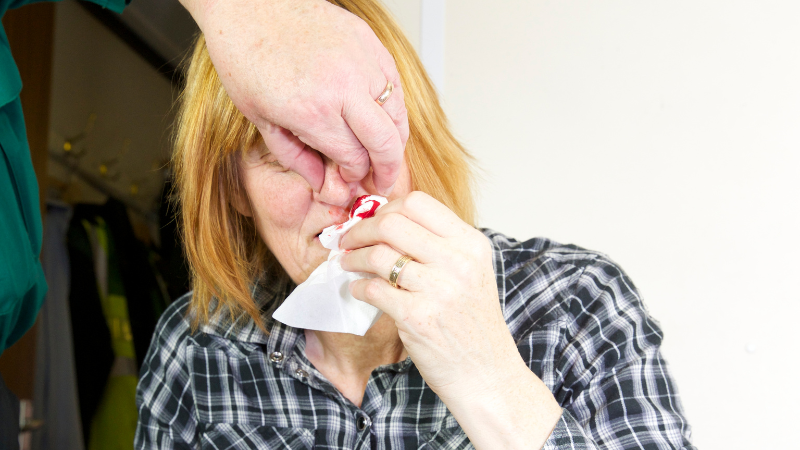Nosebleeds are considered minor irritations. But when seniors experience nosebleeds, they can be a cause for serious concern. Nosebleeds can be a symptom of a severe health condition. In most cases, nosebleeds can be avoided, treated, or prevented. Here are the causes of nosebleeds in the elderly.
What are nosebleeds?
Tissues line the inner parts of the nose. The nose also contains several blood vessels that help to warm and humidify the air that an older adult inhales. These vessels are near the surface, making them highly vulnerable to injury and consequent bleeding.
While nosebleeds normally occur in a single nostril, bleeding can sometimes occur through both nostrils. Nosebleeds typically are not a significant issue, but can be serious in the elderly. In fact, a nosebleed is considered more serious the older the individual is.
Nosebleeds fall into two primary categories: anterior and posterior. An anterior nose bleeds begins at the front of the nose, near the inner wall separates the two nostrils. Fragile capillaries and blood vessels can easily break, causing the bleeding. This type of nosebleed is easily treated at home.
A posterior nosebleed, however, is more common in the elderly and requires immediate medical attention. In this type of nosebleed, a large blood vessel breaks at the back of the nose, near the throat. These heavy nosebleeds result from deep inside the nose.
What causes nosebleeds in seniors?

1. Dry Air
Among the most common causes of anterior nosebleeds in seniors is dry air. Crusts develop inside the nose upon continuously breathing dry air, which also irritates the nasal membrane. If the senior scratches or itches the crust, breaking a blood vessel, the nose can start to bleed.
2. Chronic Diseases
Liver and kidney diseases are major causes of nosebleeds in the elderly. Frequent nose bleeds occur in seniors with these health conditions because their blood does not remain at a healthy consistency. Blood pours out of parts of the body, like the nose.
Along the same vein, other chronic health problems, such as high blood pressure and congestive heart failure, are associated with nosebleeds in older people. These ailments rapidly increase blood flow, which then damages blood vessels. Frequent nosebleeds are the consequence.
3. Anticoagulant Medications
Anticoagulant medicines are prescribed to help prevent blood clots. Aspirin is an example of this type of drug. While aspirin does not directly cause nosebleeds, an unmonitored dose can prevent the blood from forming clots and sealing wounds. After scratching the nose, heavy blood flow can occur.
4. Bleeding Disorders
Bleeding disorders, like hemophilia, develop as a result of problems with the body’s blood clotting process. In healthy people with normal clotting, platelets form a seal at the site of the injury. In seniors with bleeding disorders, the blood fails to seal wounds in the nose, resulting in nosebleeds.

5. High Altitudes
Seniors bitten by the travel bug may find themselves at high altitudes. Oxygen in the air decreases when older adults climb to higher elevations. The air they breathe becomes drier and thinner, causing the fragile lining in the nose to crack and bleed.
6. Infections
Respiratory infections, such as the common cold, the flu, Covid-19, and pneumonia, are accompanied by frequent coughing and sneezing. Symptoms of infection cause mucus, which irritates the lining of the nose. Blowing the nose or cleaning it with nasal spray can further irritate the nose and cause bleeding.
How are nosebleeds treated?
Most nosebleeds can be treated at home. To slow the blood flow, the senior must sit and lean forward, keeping the head above the heart. Leaning forward helps the blood drain out of the nose instead of into the back of the throat, where the senior can accidentally swallow it.
Squeeze the nose with an index finger and thumb. Hold the nose closed until the bleeding stops, which may happen after five minutes. If the bleeding continues, keep applying pressure for another 5 to 10 minutes. Do not blow the nose or bend over for a few hours.
Medical treatment may be required if the nosebleed continues for 20 minutes or more. Falls and injuries can also cause nosebleeds that need immediate medical care, as they can be signs of internal bleeding. Seniors who experience nosebleeds while taking blood thinners should also consult their doctor.
Can nosebleeds be prevented?
Caregivers and seniors can work together to prevent nosebleeds. Run a humidifier at night in the senior’s bedroom to add moisture to the dry, heated indoor air. Caregivers should trim the senior’s nails, keeping them short and reducing the chances of injury when scratching the nose.
Losing blood through frequent nosebleeds should be a cause for concern in the elderly. If your aging loved one suffers from regular nosebleeds, the companion caregivers from Assisting Hands Home Care can provide in-home care to address the problem and help prevent it from recurring.

Our caregivers provide transportation to doctors’ offices, where medical conditions can be diagnosed and treated. We ensure seniors are comfortable at home by turning on the humidifier, performing light housekeeping, cooking nutritious meals, helping with hygiene tasks, and offering transfer assistance.
As companion caregivers, we offer seniors invaluable companionship. We engage the elderly through games, puzzles, outings, and conversations. Our efforts keep care recipients socially active and healthy. Seniors feel confident in pursuing enjoyable recreational activities with our support and encouragement.
Companion care is vital to the well-being of seniors, especially those who live alone or who have lost a spouse. Caregivers alleviate their feelings of social isolation, loneliness, and depression. Our non-medical support with the activities of daily living is comprehensive, benefitting seniors of all ability levels.
Assisting Hands Home Care is trusted by families and their elderly loved ones in Matteson, Illinois. When the senior in your life is ready for a better quality of life, contact our home care agency. We’ll schedule a complimentary in-home consultation and develop a care plan that enhances their well-being.















